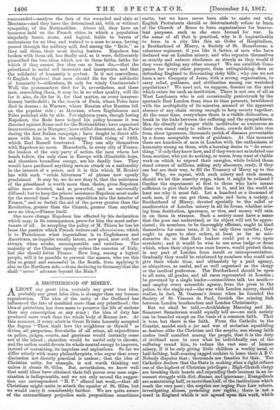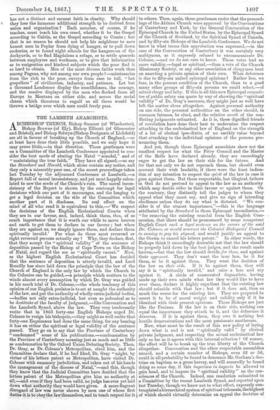A BROTHERHOOD OF MISERY.
ALMOST any great idea, certainly any great trite idea, probably any great false idea, is stronger than any human organization. The idea of the unity of the Godhead has influenced the fate of mankind more than any priesthood ; the idea of patriotism has done more to preserve the life of nations than any conscription or any army ; the idea of duty has produced more work than the whole body of Roman law. At this moment, if every adult in Great Britain honestly accepted the dogma "Thou shalt love thy neighbour as thyself" as divine, all pauperism, five-sixths of all crime, all expenditure on police, judges, courts, and garrisons would instantly cease out of the island ; churches would be useful only to elevate, and the nation could devote its whole mental energy to improve, instead of restraining, its impulses and aspirations. So far we differ utterly with many philanthropists, who argue that every discussion not directly practical is useless ; that the idea of Christian unity, for example, is not worth thinking out unless it cleans St. Giles. Bat, nevertheless, we know well that until ideas have obtained their full power over men orga- nization is indispensable, and we not only second the sugges- tion our correspondent "H. F." offered last week,—that all Christians might unite to attack the squalor of St. Giles, but we would carry it considerably further. We are quite aware of the extraordinary prejudice such propositions sometimes excite, but we have never been able to make out why English Protestants should so determinately refuse to learn of the Church of Rome to form organizations for benevo- lent purposes, such as she once formed for war. In the name of all that is practical, why is it impracticable to form in a city like this an Order of Hospitallers, a Brotherhood of Misery, a Society of St. Homobonus, volunteer regiment, if you like it better, of men who have declared war on London misery, and who organize themselves as strictly and enforce obedience as sternly as they would if they were fighting any other enemy? We ean establish Com- panies for every other purpose, from extinguishing fires or defending England to discounting risky bills ; why can we not form a new Company of Jesus, with a strong organization, to. carry relief, guidance, and civilization among our wretched_ populations ? We need not, we suppose, descant on the need which exists for such an institution. There is not one of all UtER West Londoners who is not occasionally panicstruck by the spectacle East London from time to time presents, bewildered with the multiplicity of its miseries, amazed at the apparent, absence of any chain strong enough to keep society together. At the same time, everywhere there is a visible dislocation, a, break in the links between the suffering and the sympathizers.. Men die silently of hunger while multitudes as numerous as. their own stand ready to relieve them, crowds drift into vice- from sheer ignorance, thousands perish of diseases preventable- by a dozen acceptable words of guidance. At this moment there are hundreds of men in London with the enthusiasm of humanity strong on them, with a burning, desire to "do some- thing," if only theyknew how, a,nd if they were not so isolated one- from another, who yet do nothing, or worse, from want of visible work on which to expend their energies, while behind them stand owners of millions, asking only almoners, ready, if they' can but see their way, to fill the Treasury of Mercy up to the lip. Why, we repeat, with such misery and such means,. should we let this anarchy reign, when it might be reduced V Confine the experiment at first to those who haie means. sufficient to give their whole time to it, and let the world at least see why it mast fail. Let a hundred or a thousand or such men, if we can get them, unite and form a society, a. Brotherhood of Misery, devoted specially to -the relief or amelioration of London misery in all its forms, whether aris- ing from destitution, ignorance, or vice, and money will rain in on them in streams. Such a society must have a name- that the poor can understand, or its object will not be appre- ciated; its members, to be thoroughly efficient, ought to bind_ themselves for some term, if it be only three months ; they ought to agree to obey orders, at least as far as mis- sionaries do, so that their leaders could put a veto upon, crotchets ; and it would be wise to use some badge or dress which, when their object was once known, would protect them. in any part of London from insult or misrepresentation. Gradually they would be reinforced by numbers who could not give their whole time, and ultimately by a paid agency,. as ubiquitous, as useful, and as well organized as the clergy or the medical profession. The Brotherhood should be opeu. to all sects, all grades, and all races represented in London ;. be governed by a single leader—committees talk too much— and employ every accessible agency, from the press to the- police, to the single end—the war with London misery, should realize, in fact, M. Ozanam's dream when be founded the- Society of St. Vincent de Paul, furnish the missing link. between London heathendom and London Christianity.
But we shall be told,—Archbishop Manning and Mr.. Somerset Saunderson would equally tell us—no such society can be founded except on the basis of a common faith. That is true, bat there is the faith. From the Catholic to the Comtist, amidst such a jar and war of sectarian squabbling as deafens alike the Christian and the sceptic, one strong faith makes itself manifest among the people, that it is the duty of civilized man to cure what he individually can of the suffering round him, to reduce the vast sum of human misery, if it be only giving little children a weekly meal, or half-bribing, half-coaxing ragged urchins to learn their A B C. Nobody disputes that ; thousands are fanatics for that. The Catholics declare that the State in making alms a right refuses. one of the highest of Christian privileges ; High-Church clergy are breaking their hearts and expending their incomes in an in- cessant struggle with dirt, disease, and ignoranee ; Evangelicals are maintaining half, or morethan half, of the institutions which reach the very poor; the sceptics are urging Poor Law reform, investigating abuses, preaching new rights ; there is not a, creed in England which is not agreed upon this work, which has not a distinct and earnest faith in charity. Why should they lose the immense additional strength to be derived from union and organization? Each member, of course, if he teaches, must teach his own creed, whether it be the Gospel according to Calvin, or the Gospel according to Comte ; but that is no reason he should not help his neighbour to save honest men in Poplar from dying of hunger, or to pull down rookeries, or to found night schools for the hangers-on of the dockyards, or to find Magdalens a refuge, or to settle quarrels between employers and workmen, or to give that information as to emigration and kindred subjects which the poor find it so hard to obtain. Men of the most diverse faiths work thus among Pagans, why not among our own people ?—missionaries from the rich to the poor, envoys from ease to toil, "hot gospellers" of civilization, industry, and patience. Let but a thousand Londoners display the unselfishness, the courage, and the resolve displayed by the men who flocked from all Europe to Mentana on either side, and across the social chasm which threatens to engulf us all there would be thrown a bridge over which men could freely pass.







































 Previous page
Previous page